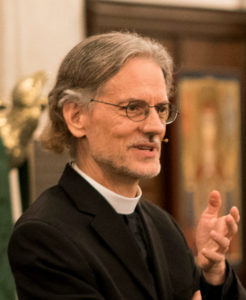The Trinity and Babies
Classic Christian trinitarian doctrine is expressed by analogy with a distinction drawn from common human experience. Here’s the distinction: There are many things that people make—physical items (houses, say) as well as intellectual ones (musical compositions). And then there are the products of our activity that are “begotten”: These are our peers and our kin. Unlike the things we make, the child two people beget becomes the third member of a family. Christian thinking recognizes the need to speak of God in terms of three “persons,” the Father, the Son, and the Holy Spirit. But God is one; he is not three individuals who joined forces to make “God, Inc.” The Father is eternally the source of the Son and, in some parallel way, also of the Spirit. Eternally—there never was a Father without Son and Spirit.
The hard problem has been to find words to talk about this mysterious reality. Still, everyone has been clear that no matter what language is used, the three identities of God are each God. Which means that none of them was created. All three persons of the Trinity are on the God-side of the creator/creature divide.
So how to talk about this? The Fathers of the First Council of Nicaea (A.D. 325) used the begotten/made distinction as an analogue to the creator/creature distinction. Of the procession of the Son from the Father, they said that he, the Son, was “begotten, not made.”
I recently studied Oliver O’Donovan’s 1984 book on bioethics Begotten or Made? with a group of young adults who were amazed at its insights and almost prophetic relevance. The point his title alludes to is that contemporary bioethics, with its reliance on technology to “make” children, tends to undermine our sense that human offspring are categorically different from any other product of human activity.
With respect to God, the Father does not decide to have the Son. Rather, the Son comes from the Father’s being, not his will. Similarly, the sexual embrace does not have as its immediate object the conception of a child. Children that come from the sexual embrace are not directly willed, but they come naturally, as it were, from the nature of the act. Lovers may hope for a child, but there are no guarantees, not to mention the genetic roulette of any particular conception. We do not will children the way we will some other change in our domestic arrangements.
Of course, that’s an old, rather antique way of thinking. The widespread use of biotechnical means to achieve conception has undermined such thinking at almost every step. The young people I was speaking with—committed Christians of evangelical persuasion—had never even heard that there could be Christian hesitations concerning in-vitro fertilization (IVF). Babies are good to have; why not use whatever we can to help people have them?
As a pastor, I have known people who have used fertility treatments of various sorts. They can be quite expensive, not to mention drawn-out, frustrating, and wearying processes. The parents are grateful when, finally, they have a child. Yet it is undeniable that, having invested so much effort in the process, a temptation is there to think of this child as a product, as something worked for and earned. To work against this, I might joke with them. “You know, all this effort and money doesn’t mean she won’t decide to shave her head when she’s fifteen (or do something else that you really don’t want)!”
We ought not to think of children as high-end consumer products. They are in a relationship to us that is analogous to the relationship of the persons of the Trinity, one to another. If we lose the begotten/made distinction, we lose an insight into the Trinity at the same time as we lose our humanity.










